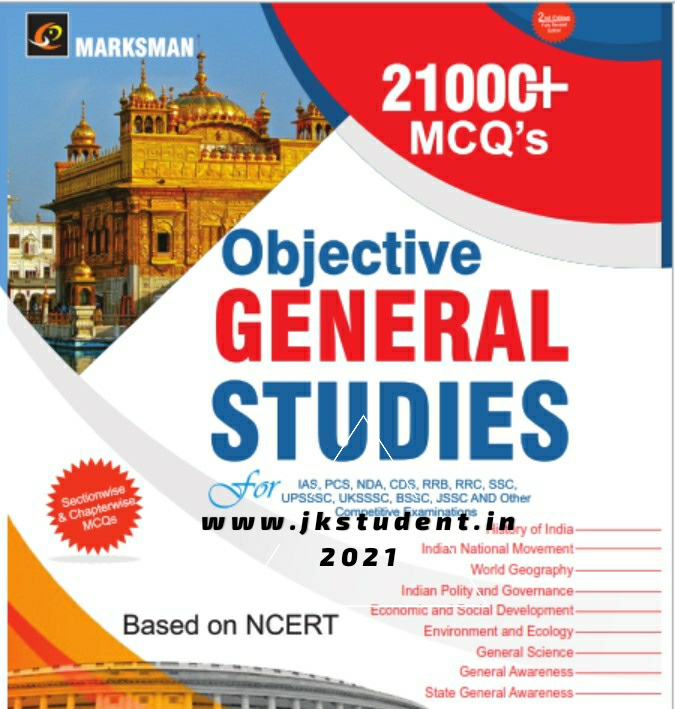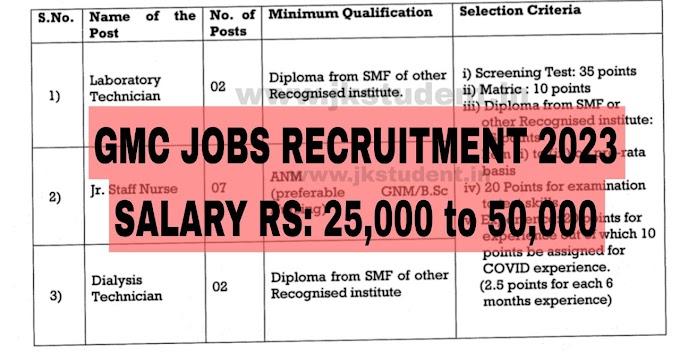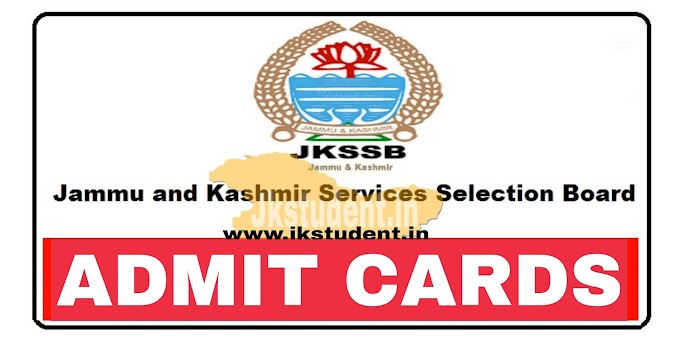Jammu and Kashmir Service Selection Board (JKSSB) today on Wednesday again Revised the Syllabus for the post of Accounts Assistant (Finance) and added Reasoning of 10 marks.
NOTICE
Whereas, the J&K Services Selection Board advertised posts of various categories vide Advertisement Notification No. 04 of 2020 dated: 16.12.2020, and;
Whereas, the Board notified Syllabi for various posts advertised vide aforesaid advertisement notification including the post of Accounts Assistant (Finance) vide Notice No. SSB/Secy/Sel/2020/5141-44 Dated 24.12.2020, and;
Whereas, the Board decided to update the syllabus with respect to contents and distribution of marks for the post of Accounts Assistant (Finance) notified vide aforesaid notice.
Now, therefore, revised syllabus for the post of Accounts Assistant (Finance) advertised vide Advertisement Notification No. 04 of 2020 dated: 16.12.2020 under item No. 106 is notified afresh as per the details given in the Annexure to this notice.
This notice is for the purpose of intimation to the concerned candidates only
Also Check:- JKSSB Syllabus for the Recently Advertised 1700 posts
Annexure Subject: Syllabus for Written test (Objective Type) for the post of Accounts Assistant (Finance).
Marks: 120 Time: 02:00 Hours
General Knowledge with special reference to J&K UT 20 Marks
(i) Popular names of personalities (Religion, Politics, Scientific discoveries, Geographical, Sports, History)
(ii) Centrally Sponsored Schemes- Guidelines and objectives.
(iii) Climate and crops in J&K and India.
(iv) Current events of Local, National and International importance.
(v) Weather, Climate, Crops, Means of Transport.
(vi) J&K History, Economy and Culture
(vii) Flora and Fauna of J&K
(viii) Rivers and Lakes.
(ix) Important Tourist Destinations.
(x) J&K Panchayati Raj Act, 1989 (as amended upto December, 2020), 73rd & 74th Constitutional amendments.
(xi) J&K Reorganisation Act, 2019
Statistics 15 Marks
(i) Primary and secondary data.
(ii) Tabulation and compilation of Data
(iii) Measures of central Tendency
(iv) Theory of Probability
(v) Correlation and regression- Concept and simple applications.
(vi) Theory of Attributes- Basic concepts and their applications.
(vii) Theory of Index Numbers: Tests of Index numbers- Wholesale and consumer price Index numbers.
(viii) Demography-Census, its features and functions.
(ix) Vital Statistics- Measures of fertility, Crude fertility rates, specific fertility rates, gross and net reproduction rates., Measures of Mortality
General Economics 15 Marks
(i) Introduction of Economics- Basic concept and Principles.
(ii) Fiscal & Monetary Policy- Meaning, Scope and Methodology.
(iii) Theory of consumers demand using indifference curve technique.
(iv) Demand Analysis
(v) Factor Pricing –Marginal productivity Theory & Ricardian Theory of Rent
(vi) Pricing under various forms of Market.
(vii) Factors of production & Laws of Production.
(viii) Concept of Economic Growth and its measurement
(ix) Characteristics and problems of developing economy
(x) Planning vs Market Economy. (xi) Economic Reforms in India
(xii) Concepts of National Income.
(xiii) Inflation- Meaning, Types, Effects.
Mathematics 15 Marks
(i) Set Theory - Basic Concepts & Applications.
(ii) Matrices & Determinants, Simultaneous Linear Equations- Cramer’s Rule.
(iii) Analytical Geometry.
(iv) Differentiation- Basic Concepts (Addition, Product & Chain rule)
(v) Optimization using Differential techniques.
(vi) Integration-Reduction & Substitution Method.
(vii) Linear Differential Equations.
(viii) Differential Equations Existence theorem for the solution of dy/dx = f(x,y)
Also Check:- JKSSB Syllabus for the Recently Advertised 1700 posts
Knowledge of Computers 15Marks
(i) Introduction and Objectives.
(ii) Basic Applications of Computer and its component.
(iii) Fundamentals of computer sciences.
(iv) Hardware & Software, Concept of Open Source Technologies.
(v) Input & output Devices.
(vi) Knowledge of MS Word, MS Excel, MS Access, MS Powerpoint, PDF Internet and E-mail.
(vii) Concept of Computer Virus and Anti-Virus.
(viii) Terms and Abbreviation used in IT.
Accountancy and Book Keeping 15 Marks
(i) Introduction to Financial Accounting and its terms.
(ii) Accounting equation and Journal.
(iii) Voucher Approach in Accounting.
(iv) Bank reconciliation Statement.
(v) Financial Management/Statements.
(vi) Partnership Accounts.
(vii) Ledger Accounts.
(viii) Cash Book, Financial Audit.
(ix) Elements of Double entry Book Keeping.
(x) Rules for journalizing.
(xi) Trial Balance.
(xii) Trading Account.
(xiii) Profit Loss Account and Balance Sheet.
(xiv) Concept of Social Accounting, Social Audit and cash based single entry system of accounting.
(xv) Public Financial Management System (PFMS).
General Science 15 Marks
(i) Various sources of energy; conventional sources of energy; improvement in technology for using conventional source of energy (Biomass and wind energy)
(ii) Non-conventional sources of energy (Solar energy,Tidal energy).
(iii) Mechanics, Rest, motion, Velocites, acceleration, Newton Laws of motion,
(iv) Voltage, Current, Resistance, Power, D.C Batteries
(v) Waves, light as a wave, Sound waves, Transverse and longitudinal waves.
(vi) Structure of Atom
(vii) Solids, Liqids and Gases(Basics)
(viii) Life processes: Nutrition and its types, Respiration, Transportation of water, food and minerals in plants.
(ix) Vitamins- Dieases related to vitamin deficiency.
(x) Environmental pollution.
(xi) Ecosystem – Its components, Food chains and Food webs.
(xii) Ozone layer, its depletion, Green House Effect.
Mental Ability & Reasoning 10 Marks
(i) Number series.
(ii) Letter series.
(iii) Coding decoding.
(iv) Direction sense.
(v) Blood relations.
(vi) Mathematical reasoning.
(vii) Speed, Distance and Time.
(viii) Statements and conclusions.
(ix) Logical Reasoning.
(x) Mental Reasoning.










Please Do not spam comment box we appreciate for your valuable comment